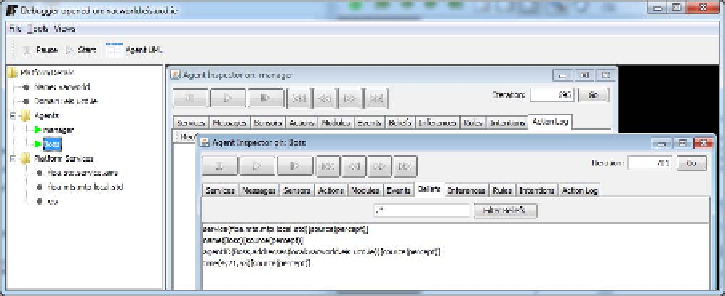Information Technology Reference
In-Depth Information
production rules; only the CodeGeneratorVisitor must be modified to handle the new
language constructs. At runtime, the ScriptBasedXXXXAgent outlined in section 2.2
invokes this compiler, and uses the resulting object files to initialise the interpreter.
2.4
Tool Support
Debugger Framework.
The Agent Factory Debugger is a highly extensible tool de-
signed to be easily customisable for different agent architectures. The debugger allows
agents to be collectively suspended or resumed as well as individually resumed, sus-
pended and stepped.
The debugger provides a default inspector for all agent factory agents which details
the platform services subscribed to and a log of incoming and outgoing messages. This
default inspector also manages the state history of the agent and can be easily extended
to include much more information, requiring only the extension of two components: the
state manager and the inspector.
Fig. 5.
Screeenshot of the debugger
A screen shot of the Agent Factory debugger is shown in Figure 5, this shows the the
Agent Inspectors and controls for two agents of the same type. In this situation there
is only one instance of the
StateManagerFactory
and
InspectorFactory
, these factories
create a seperate
StateManager
and
Inspector
(Visible in the right pane of the figure)
for each agent .
Each agent's StateManager is responsible for updating its Inspector at the end of
every execution cycle. To this end the StateManager creates a
Snapshot
of the current
internal state of the agent and passes it to the Inspector. Extending the functionality
of the inspector requires the addition of new InspectorPanels formatted to display the
required information and the extension of the Snapshot class to include the data required
to update the Inspector.
Eclipse Integration.
Eclipse integration with Agent Factory is provided through the
use of a number of plugins, one which provides the Agent Factory libraries as well as a

